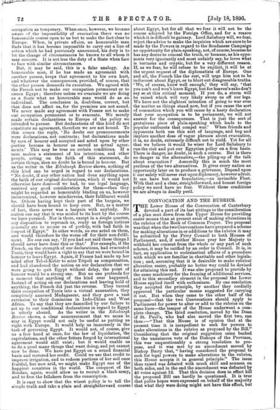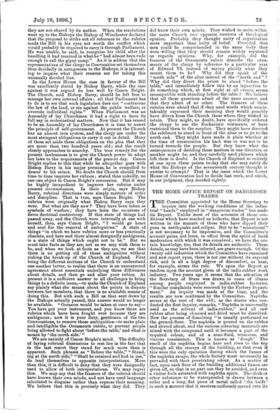CONVOCATION AND THE RUBRICS. T HE Lower House of the Convocation
of Canterbury devoted a part of its last sittings to the consideration of a plan sent down from the Upper House for providing easier means than at present exist of making alterations in the rubrics of the Book of Common Prayer. The proposal was that when the two Convocations have prepared a scheme for making alterations in or additions to the rubrics it may be submitted by the Privy Council to both Houses of Parliament, and, if neither House pray her Majesty to withhold her consent from the whole or any part of such scheme, it may be ratified by an order in Council. It is, in fact, an application to ecclesiastical affairs of a procedure with which we are familiar in charitable and other legisla- tion; and, assuming that it is desirable to make rubrical alteration easier, probably no better way could be devised for attaining this end. It was also proposed to provide by the same machinery for the framing of additional services, and to this secondary element in the proposal the Lower House applied itself with enthusiasm. By one resolution they accepted the principle, by another they cordially approved the particular means suggested for carrying it out. But when they came to the other half of the proposal—that the two Convocations should apply to Parliament for power to alter or add to the rubrics on the same lines—the temper of the House underwent a com- plete change. The third resolution, moved by the Dean of St. Paul's, who had also moved the first two, ran thus :—" That this House is of opinion that at the present time it is inexpedient to seek for powers to make alterations in the rubrics as proposed by the Bill." Considering that the original suggestion came backed by the unanimous vote of the Bishops of the Province, this was unquestionably a strong resolution to pro- pose, and it was met by an amendment moved by Bishop Barry that, "having considered the proposal to seek for legal powers to make alterations in the rubrics, this House accepts it in general principle." The issue thus raised was debated with much skill and acumen on both sides, and in the end the amendment was defeated by 40 votes against 12. That this decision does in effect kill the proposed Bill can hardly be questioned. It is true that polite hopes were expressed on behalf of the majority that what they were doing might not have this effect, but they are not shared by its author. When the resolutions went up to the Bishops the Bishop of Winchester declared that the proposal to strike out all reference to the rubrics made the Bill in his eyes not worth the conflict which would probably be required to carry it through Parliament. He was unable, he said, to recognise his child after the handling it had received in what he" had almost been rude enough to call the gipsy camp." As it is seldom that the representatives of the clergy in Convocation set themselves thus decidedly in antagonism to the Bishops, it is interest- ing to inquire what their reasons are for taking this unusually decided line. In the Lower House the case in favour of the Bill was excellently stated by Bishop Barry, while the case against it was argued no less well by Canon Bright. The Church, said Bishop Barry, should be left free to manage her own internal affairs ; all that Parliament has to do is to see that such legislation does not "contravene the law of the land, or sin against the public welfare, or override individual rights." When Parliament was an Assembly of lay Churchmen it had a right to have its full say in ecclesiastical matters. Now that it has ceased to be an Assembly of lay Churchmen it is time to assert the principle of self-government. At present the Church has an almost iron system, and the clergy are under the most stringent obligations to carry it out in detail. Many of them set aside these obligations on the plea that they are more than two hundred years old ; and the result closely approaches to anarchy. The true remedy for the present lawlessness is to give the Church power to adapt her laws to the requirements of the present day. Canon Bright replies to this that while he altogether goes with Bishop Barry in his major premiss, he is compelled to demur to his minor. No doubt the Church should from time to time improve her rubrics ; stated thus nakedly, no one can object to Canon Bright's concession. But it may be highly inexpedient to improve her rubrics under present circumstances. In their origin, says Bishop Barry, rubrical directions were simply matters of order and discipline. That is true, says Canon Bright. The rubrics were originally what Bishop Barry says they were. But what are they now ? They have been taken as symbols of warfare ; they have been the occasions of fierce doctrinal controversy. If this state of things had passed away, and the Church were internally at one with herself, then, says Canon Bright, "I would go heart and soul for the removal of ambiguities." A state of things "in which we have rubrics more or less practically obsolete, and here and there almost designedly ambiguous, is a state of things which ought not to be." But we must take facts as they are, not as we may wish them to be, and when we look at facts as they are, we see that there is no getting rid of these ambiguities without risking the break-up of the Church of England. First bring the different sections of the Church to understand one another better, to realise that there is an unsuspected agreement about essentials underlying these differences about details, and then go and alter your rubies. At present it is a sufficient answer to all challenges to bring things to a definite issue,—to make the Church of England say plainly what she means about the points in dispute between her members, that there is no available means of doing this. But with such a Bill as that sent down by the Bishops actually passed, this answer would no longer be available. "Occasion would be taken at once to say— You have got your instrument, and you know there are rubrics which have been fought over because they are ambiguous ; now it is your duty, gentlemen of the two Convocations, to remove these ambiguities—to make plain and intelligible the Ornaments rubric, to prevent people being allowed to fight about 'before the table,' and what is meant by the north side."
We are entirely of Canon Bright's mind. The difficulty of laying rubrical dissensions to rest lies in the fact that in the last resort they stand for much more than is apparent. Such phrases as "Before the table," " Stand- ing at the north side," "Shall be retained and had in use," do lend themselves to opposite interpretations. More than this, it is difficult to deny that they were designedly used to allow of both interpretations. We may regret this. We may say that the framers of the rubrics should have known their own minds, and not have used language calculated to disguise rather than express their meaning. We believe that this is precisely what they did. They did know their own minds. They wished to unite withit the same Church two • opposite currents of theological opinion. Probably they thought unity of organisation more important than unity of belief. Provided that men could be comprehended in the same body they were willing that they should remain widely separated as regards opinions. Why, for example, did the framers of the Ornaments rubric describe the orna- ments of the clergy by reference to a particular year of Edward VI. instead of saying plainly what they meant them to be ? Why did they speak of the "north side" of the altar instead of the "north end " ? Why did they direct the priest to stand "before the table," and immediately follow this by an injunction to do something which, at first sight at all events, seems incompatible with standing before the table ? We believe that all these questions admit of the same answer, and that they admit of no other. The framers of these rubrics were afraid that if they used words which unmis- takeably expressed their meaning they would possibly have driven from the Church those whom they wished to retain. They might, no doubt, have specifically ordered the clergy to use the Eucharistic vestments, or have restricted them to the surplice. They might have directed the celebrant to stand in front of the altar or to go to the north end. They might have made it plain whether at the time of consecration his back was or was not to be turned towards the people. But they knew what the consequences of deciding these matters in one direction or another might be, and they carefully used phrases which left them in doubt. Is the Church of England so entirely at one upon these points to-day that she may safely do what the Bishops of the seventeenth century thought it unwise to attempt? That is the issue which the Lower House of Convocation had to decide last week, and which, in our judgment, they decided rightly.



































 Previous page
Previous page